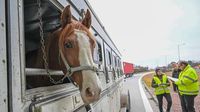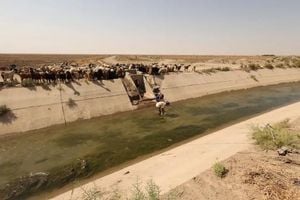Austria is taking significant measures to combat the spread of foot-and-mouth disease (FMD) by temporarily closing 24 border crossings to Hungary and Slovakia. This decision, effective from Saturday, April 5, 2025, is a direct response to an outbreak of the highly contagious virus in neighboring countries, which has prompted fears of its introduction into Austria.
According to the Austrian Federal Ministry of the Interior, the closures are expected to remain in effect until May 20, 2025. The ministry stated that the regulation was made in close consultation with national health authorities, including the agricultural chamber and the Federal Ministry for Agriculture and Forestry. "Closed border crossings represent a less personnel-intensive measure compared to border controls at open crossings," the ministry explained.
In addition to the border closures, police will increase vehicle checks at remaining open crossings, focusing particularly on trucks and other vehicles. These measures aim to prevent the virus from spreading into Austria, especially in border regions. The police will be stopping vehicles to check documents and ensure compliance with health regulations.
FMD is a viral disease that primarily affects cloven-hoofed animals, including cattle, pigs, sheep, goats, and even certain wild animals. Symptoms of FMD include fever, blisters, and inflammation in the mouth and hooves. Although the disease is not transmissible to humans through food consumption, humans can potentially transmit the virus to animals through contaminated clothing or direct contact.
Austria has been vigilant in its border control efforts since autumn 2023, when it began monitoring crossings to the Czech Republic and Slovakia. Controls at the Hungarian border have been in place since 2015. The recent outbreak in Slovakia and Hungary has prompted these additional measures to contain the disease.
In Hungary, thousands of cattle are being culled as part of the response to the outbreak, which has been spreading since March 2025. The Hungarian Minister of Agriculture, Richard Takac, has described the situation as a "disaster for agriculture." The swift actions taken by Austria reflect a commitment to protecting its livestock and agricultural economy.
Despite the availability of vaccines for FMD, officials have stated that vaccinations will only be considered in emergencies, as they do not prevent infection but can reduce the infectiousness of vaccinated animals. Dr. Robert Fux, a virologist from the Ludwig Maximilian University of Munich, emphasized that vaccination could have significant economic implications, limiting the market for meat from vaccinated animals.
Currently, no cases of FMD have been reported in Austria, but the government is taking no chances. The import of live animals, fresh meat, raw milk, and other products from affected neighboring countries has been halted to further mitigate the risk of disease transmission.
Travelers, particularly those planning to visit Austria for the Easter holidays, should note that the border closures may impact travel plans. However, as of now, the German Foreign Office has not issued any travel warnings concerning the situation. Tourists wishing to stay in Austria are not expected to face issues related to the border closures.
In light of the ongoing situation, the Austrian government is urging citizens and travelers to remain vigilant and adhere to health guidelines. The potential economic fallout from an FMD outbreak could be severe, affecting not only livestock farmers but also the broader agricultural sector.
As the situation develops, authorities will continue to monitor the spread of the disease and adjust their strategies accordingly. The priority remains clear: to safeguard Austria's agricultural industry and prevent the introduction of foot-and-mouth disease into the country.










